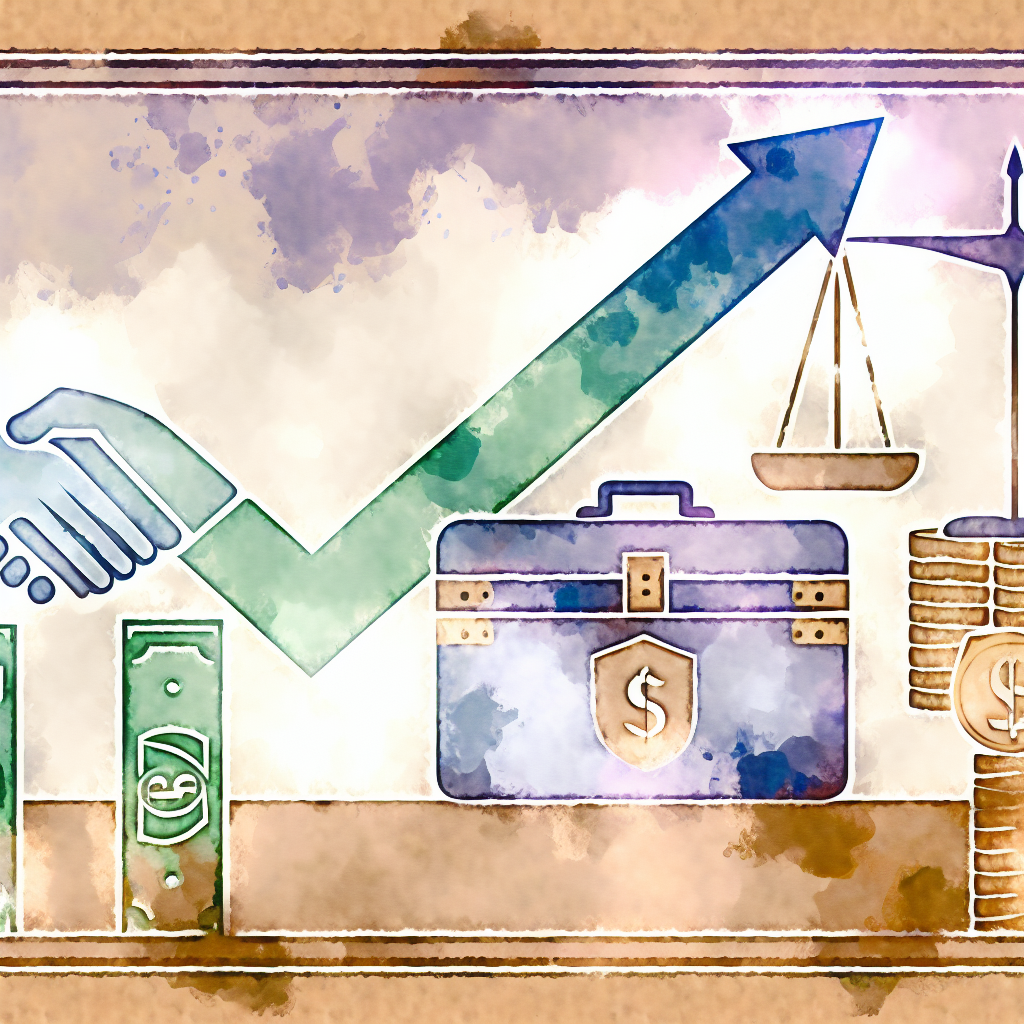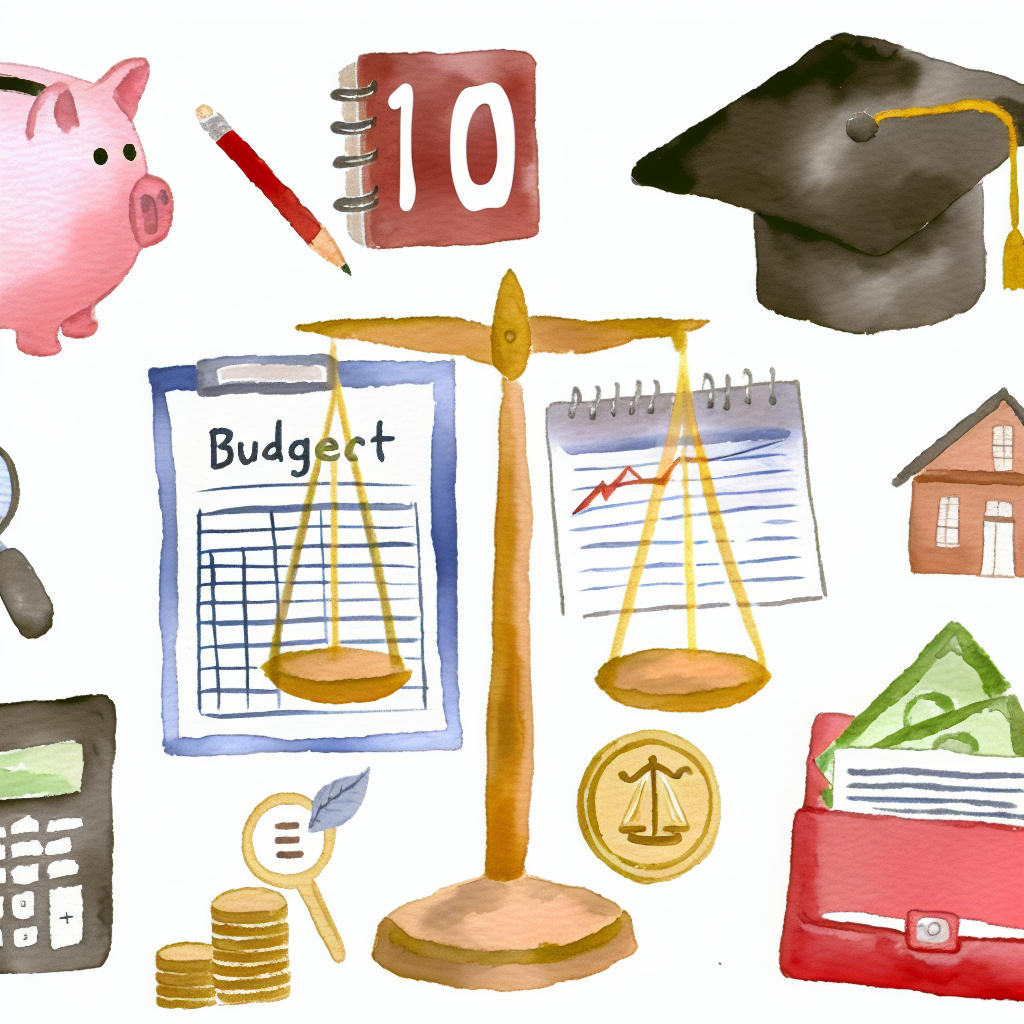How to Improve Your Credit Before Applying for a Mortgage Loan
Introduction: Importance of a Good Credit Score for Mortgage Applications
Embarking on the journey to homeownership is an exciting venture, but it requires meticulous preparation, particularly regarding your financial standing. One of the most crucial aspects is your credit score, a three-digit number that can significantly influence your ability to secure a mortgage loan. Lenders rely heavily on credit scores to assess the risk of lending money to prospective homebuyers. Thus, a good credit score can open doors to better interest rates, loan terms, and ultimately, a smoother path to homeownership.
A strong credit score is a sign of financial responsibility, reflecting your ability to manage debts and make timely payments. It gives lenders confidence in your ability to handle the financial burden of a mortgage. Conversely, a poor credit score can lead to higher interest rates or even disqualification from obtaining a mortgage altogether. Therefore, understanding and improving your credit score should be a top priority before applying for a mortgage.
It’s essential to start this process well in advance of your mortgage application. Building or improving credit is not an overnight endeavor—it requires a strategic approach and consistent effort over several months or even years. By taking proactive steps to enhance your credit score, you position yourself as a more appealing candidate to lenders, increasing your chances of securing a favorable mortgage loan.
In this comprehensive guide, we will delve into various strategies and actionable steps you can take to improve your credit score before applying for a mortgage loan. From understanding the factors that influence your credit score to setting realistic goals, this article will equip you with the knowledge and tools you need to pave the way to your dream home.
Understanding What Affects Your Credit Score
Several factors contribute to your credit score, and understanding them is the first step toward improvement. Your credit score is typically calculated based on five key factors: payment history, amounts owed, length of credit history, new credit inquiries, and types of credit.
Payment History: Your payment history accounts for 35% of your credit score. It records your ability to pay your bills on time. Late or missed payments can significantly harm your credit score, so being consistent with timely payments is crucial.
Amounts Owed: Also known as credit utilization, this factor comprises 30% of your score. It refers to the amount of credit you’re using relative to your credit limit. High credit utilization suggests you’re relying heavily on credit, which can be a red flag to lenders.
Length of Credit History: This factor, making up 15% of your score, considers the age of your oldest and newest accounts and the average age of all your accounts. A longer credit history can positively impact your score as it provides more data on your credit behavior.
New Credit Inquiries: Comprising 10% of your score, this factor includes the number of new accounts you’ve opened and the credit inquiries made. Frequent credit applications can indicate financial instability, potentially lowering your score.
Types of Credit: The final 10% is based on the variety of credit accounts you have, such as credit cards, mortgages, and car loans. A diverse credit mix shows you can manage different types of credit, which can be beneficial for your score.
Understanding these components helps you identify areas needing attention, informing your strategy to enhance your score before applying for a mortgage.
Reviewing Your Credit Report: How to Identify and Correct Errors
Regularly reviewing your credit report is an essential step in maintaining a healthy credit score. The information in your credit report directly affects your credit score, so accuracy is crucial. Errors in your report can unjustly lower your score, hindering your ability to secure a mortgage loan.
You are entitled to a free credit report from each of the three major credit bureaus—Equifax, Experian, and TransUnion—once every 12 months through AnnualCreditReport.com. Start by requesting and thoroughly reviewing these reports for any inaccuracies such as incorrect account information, outdated personal details, or erroneous late payments.
Common Errors to Look For
- Incorrect Personal Information: Check for any errors in your name, address, or Social Security number. Even minor inaccuracies can lead to confusion and potential credit issues.
- Duplicate Accounts: Ensure that each account is listed only once and there are no duplicate entries, which can negatively impact your credit score.
- Incorrect Account Status: Verify that closed accounts are marked as such and any delinquent or derogatory remarks are accurate.
- Inaccurate Payment History: Look for any late payments falsely attributed to your account, which can significantly harm your score.
Steps to Correct Errors
- Dispute the Error: Contact the credit bureau reporting the error to start the dispute process. You can usually do this online, by phone, or via mail.
- Provide Documentation: Supply any necessary documentation to support your claim. This can include bank statements or correspondence with creditors.
- Follow Up: Monitor the progress of your dispute. The credit bureau is required to investigate within 30 days and inform you of the outcome.
Correcting errors on your credit report can result in an immediate boost to your credit score, paving the way for a better mortgage application process.
Strategies to Pay Down Outstanding Debts Efficiently
Outstanding debts can weigh heavily on your credit score and impede your ability to qualify for a mortgage. Efficiently managing and reducing these debts is crucial for improving your credit profile.
One effective strategy is the Debt Snowball Method. This approach involves listing all your debts from smallest to largest balance, focusing on paying off the smallest debts first while making minimum payments on larger debts. As you pay off each small debt, roll the payment amount into the next smallest debt, creating a snowball effect.
Another method is the Debt Avalanche Method, which prioritizes debts with the highest interest rates. By tackling high-interest debts first, you reduce the overall amount of interest you pay, potentially saving money in the long run.
Pros and Cons of Each Method:
| Method | Pros | Cons |
|---|---|---|
| Debt Snowball Method | Quickly eliminates smaller debts, providing quick wins | May take longer to pay off total debt due to higher interest costs |
| Debt Avalanche Method | Reduces overall interest paid, potentially saving more money | May lack the psychological boost from paying off small debts quickly |
Choosing the method that best fits your financial situation and personality can make debt reduction more manageable and effective.
Additionally, consider consolidating high-interest debts into a single loan with a lower interest rate. This can simplify your payments and reduce the interest you accrue over time. Always research and compare consolidation loans or balance transfer offers to ensure you’re getting the best deal.
By employing these strategies, you can efficiently reduce outstanding debts, improve your credit utilization ratio, and positively impact your credit score before applying for a mortgage.
The Impact of Timely Payments on Your Credit Score
Making timely payments is one of the most significant factors influencing your credit score. Consistent, on-time payments demonstrate reliability and financial responsibility, reassuring lenders of your ability to manage debt.
Benefits of Timely Payments:
- Builds Positive Credit History: Each timely payment adds a positive mark to your credit history, contributing to a higher credit score.
- Avoids Penalties and Fees: Paying on time helps you steer clear of late fees and penalties that can accumulate and exacerbate your debt situation.
- Improves Lender Confidence: A track record of timely payments boosts lender confidence, increasing your chances of obtaining favorable loan terms.
To ensure you never miss a payment, set up automatic payments for all your bills and debts whenever possible. Additionally, creating a monthly budget can help you manage your finances more effectively and prioritize your payments.
Consequences of Late Payments:
On the flip side, late payments can severely damage your credit score. Just one late payment can stay on your credit report for up to seven years, although its impact diminishes over time. Frequent late payments can suggest financial instability, leading to higher interest rates or loan denials.
If you do miss a payment, address it as quickly as possible. Contact your creditor to explain the situation and make arrangements to bring your account current. Demonstrating a proactive approach can sometimes result in leniency from your creditor, mitigating the negative impact on your credit score.
Ultimately, prioritizing timely payments is a cornerstone of good credit management, essential for preparing your credit profile for a mortgage application.
Managing Credit Utilization and Reducing Credit Card Balances
Credit utilization, or the amount of credit you’re using compared to your total credit limit, is a critical aspect of your credit score. A lower credit utilization ratio indicates responsible credit use and positively affects your credit score.
Tactics to Manage Credit Utilization:
- Pay Down Balances: Focus on reducing your current credit card balances. Aim to keep your utilization ratio below 30% of your total available credit.
- Increase Credit Limits: Request a credit line increase from your card issuers. If you maintain the same balance, this lowers your utilization ratio.
- Distribute Balances Across Cards: Rather than maxing out one card, distribute balances to maintain a lower utilization percentage on each card.
Example:
| Credit Card | Credit Limit | Current Balance | Utilization Ratio |
|---|---|---|---|
| Card A | $5,000 | $1,500 | 30% |
| Card B | $3,000 | $500 | 17% |
| Card C | $2,000 | $1,000 | 50% |
In this example, by paying down Card C below $600, your overall utilization ratio improves, benefiting your credit score.
Besides paying down balances, avoid closing unused credit card accounts unless absolutely necessary. Closing accounts can reduce your total available credit, increasing your utilization ratio. If you do choose to close an account, do so selectively and strategically.
Regular Monitoring: Keep a close eye on your credit card balances and spending habits. Regularly review your statements and credit reports to ensure your utilization ratio remains favorable.
By actively managing your credit utilization, you can make a substantial impact on your credit score, enhancing your mortgage loan application prospects.
Avoiding New Credit Inquiries and Loans During the Process
When preparing to apply for a mortgage loan, it’s crucial to avoid making new credit inquiries or taking out new loans. Each new credit inquiry can temporarily lower your credit score, potentially jeopardizing your mortgage application.
Why Avoid New Credit?
- Credit Score Impact: Each hard inquiry can reduce your credit score by a few points. Multiple inquiries in a short period can compound this effect, making you appear riskier to lenders.
- Increased Debt Load: New credit accounts add to your overall debt load, which can negatively impact your debt-to-income ratio—a key metric lenders use to assess your borrowing capacity.
Types of Inquiries:
- Soft Inquiries: These do not affect your credit score and include checks made by you, employers, or pre-approved offers.
- Hard Inquiries: These occur when a lender checks your credit for a loan or credit card application, impacting your score.
Tips to Avoid New Credit Inquiries:
- Pause Applications: Refrain from applying for new credit cards, auto loans, or personal loans during the mortgage application process.
- Communicate with Lenders: If you must make an inquiry, explain your situation to the lender. Some lenders may offer “rate shopping” periods, where multiple inquiries within a short timeframe count as a single inquiry.
By minimizing new credit inquiries, you protect your credit score and present a stable, responsible financial profile to prospective mortgage lenders.
Maintaining a Balanced Credit Mix
A balanced credit mix, which includes a variety of credit types, can positively influence your credit score. Lenders like to see that you can manage multiple forms of credit responsibly, from revolving accounts like credit cards to installment loans like mortgages and auto loans.
Benefits of a Balanced Credit Mix:
- Reflects Credit Management Skills: Successfully handling different types of credit demonstrates your ability to manage diverse financial obligations.
- Boosts Credit Score: Credit mix accounts for 10% of your credit score. Maintaining a variety of credit can help improve this portion of your score.
Examples of Credit Types:
| Credit Type | Description | Examples |
|---|---|---|
| Revolving Credit | Credit with a variable balance and a credit limit | Credit cards, Retail store cards |
| Installment Credit | Loans with fixed payments over a predetermined period | Mortgages, Auto loans, Student loans |
Achieving a Balanced Mix:
- Diversify Gradually: If your credit profile lacks variety, consider strategically adding different types of credit over time. For example, if you only have credit cards, an auto or personal loan could add diversity.
- Monitor Existing Accounts: Ensure that you’re managing your existing accounts well. Late payments on any type of credit can harm your overall score.
Responsible Addition:
While striving for a balanced mix, avoid opening too many new accounts at once. Doing so can lead to multiple inquiries and a higher risk of overextending your credit. Aim for gradual diversification and always prioritize responsible management of current credit obligations.
Maintaining a balanced credit mix enhances your credit profile, giving you a competitive edge when applying for a mortgage loan.
The Role of Credit Counseling and Financial Planning Services
Credit counseling and financial planning services can be invaluable resources for managing your credit and preparing for a mortgage application. These services offer professional advice and strategies to help you improve your financial health and navigate credit challenges.
Credit Counseling:
Credit counseling agencies assist in creating a plan to pay off debt and improve your credit score. Counselors typically review your financial situation, provide budgeting advice, and may help you set up a debt management plan (DMP).
Advantages of Credit Counseling:
- Expert Guidance: Counselors provide professional advice tailored to your circumstances.
- Debt Management Plans: DMPs negotiated by counselors can lead to reduced interest rates or waived fees from creditors.
- Financial Education: Counselors offer insights into credit management and improving financial habits.
Financial Planning Services:
Financial planners take a broader approach, focusing on your overall financial health, including savings, investments, and long-term financial goals. They help create a comprehensive plan to achieve these goals while improving your credit.
Advantages of Financial Planning:
- Holistic Approach: Planners consider all aspects of your finances, ensuring a well-rounded strategy.
- Goal Setting and Tracking: Planners help set realistic financial goals and track your progress.
- Investment Advice: Planners provide guidance on building and managing investments, contributing to long-term wealth.
How to Choose a Service:
When selecting a credit counselor or financial planner, verify their credentials and reputation. Look for affiliations with reputable organizations, such as the National Foundation for Credit Counseling (NFCC) or the Certified Financial Planner Board of Standards (CFP Board).
By leveraging the expertise of credit counseling and financial planning services, you can create a solid foundation for improving your credit score and achieving sustainable financial health before applying for a mortgage.
Setting Realistic Goals and Timelines for Credit Improvement
Improving your credit score is a marathon, not a sprint. Setting realistic goals and timelines ensures that you make consistent progress without becoming overwhelmed. A well-defined plan helps you stay focused and motivated throughout the process.
Establishing Goals:
Start by identifying specific, measurable goals for your credit improvement journey. For example:
- Reduce Credit Utilization: Aim to reduce your credit utilization ratio to below 30% within six months.
- Pay Down Debts: Set a goal to pay off a specific amount of debt each month.
- Correct Credit Report Errors: Plan to review and dispute any errors on your credit report within the next month.
Creating a Timeline:
Once you’ve defined your goals, create a timeline with actionable steps. A timeline adds structure to your plan, helping you stay on track.
Sample Timeline:
| Month | Action |
|---|---|
| 1 | Obtain and review credit reports for errors |
| 2 | Dispute any inaccuracies |
| 3-6 | Implement debt reduction strategies |
| 7-9 | Focus on reducing credit utilization |
| 10-12 | Monitor credit score progress and adjust strategies |
Continuous Monitoring and Adjustment:
Regularly monitoring your progress is key to staying on track. Use credit score tracking tools to observe changes and adjust your strategies as needed. If you encounter setbacks, revisit your goals and timeline to make necessary adjustments.
Setting realistic goals and timelines helps you navigate the credit improvement process with clarity and purpose, enhancing your ability to secure a mortgage loan.
Conclusion: Final Steps Before Applying for a Mortgage Loan
As you approach the final stages of preparing for a mortgage application, there are several key steps to ensure your credit profile is as strong as possible. Completing these steps can boost your confidence and increase your chances of mortgage approval.
Recheck Your Credit Reports:
Before submitting your mortgage application, obtain the most recent versions of your credit reports from the three major credit bureaus. Verify that all information is accurate and that any disputes have been resolved.
Maintain Positive Financial Habits:
Continue practicing the positive financial habits you’ve developed throughout your credit improvement journey:
- Timely Payments: Keep making all payments on time to preserve your credit score gains.
- Stable Credit Utilization: Maintain a low credit utilization ratio by managing your balances responsibly.
- Avoid New Credit: Refrain from opening new credit accounts or making major financial changes until after your mortgage is secured.
Consult with a Mortgage Advisor:
Consider consulting with a mortgage advisor to review your financial readiness. An advisor can provide insights into the mortgage process, help you understand your loan options, and ensure that you’re well-prepared for the application.
In conclusion, improving your credit score before applying for a mortgage loan requires a multifaceted approach. By understanding what affects your credit score, correcting errors, managing debts, and employing strategic financial habits, you can enhance your credit profile and position yourself as a strong candidate for homeownership.
Recap
- A good credit score is crucial for favorable mortgage loan terms.
- Understanding factors that affect your credit score helps identify areas for improvement.
- Regularly review your credit report for errors and dispute inaccuracies.
- Implement strategies like the Debt Snowball or Debt Avalanche to reduce outstanding debts.
- Make timely payments to build a positive credit history.
- Manage credit utilization by reducing balances and avoiding closing accounts.
- Avoid new credit inquiries and loans during the mortgage application process.
- Maintain a balanced credit mix to demonstrate credit management skills.
- Seek guidance from credit counseling and financial planning services.
- Set realistic goals and timelines to stay on track with credit improvement.
FAQ
Q1: How often should I check my credit report?
A1: You should review your credit report at least once a year from each of the three major credit bureaus.
Q2: What is the ideal credit utilization ratio?
A2: Aim for a credit utilization ratio below 30% to positively impact your credit score.
Q3: How long does it take to improve a credit score?
A3: Improving your credit score can take several months to years, depending on your starting point and financial habits.
Q4: Can closing a credit card affect my credit score?
A4: Yes, closing a credit card can increase your credit utilization ratio and shorten your credit history, potentially lowering your score.
Q5: What is a hard inquiry?
A5: A











